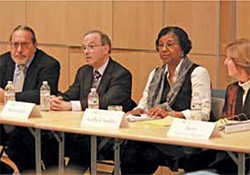
“There are few experiences in family life that are as challenging, both emotionally and physically, as family care,” began Dr. Steven H. Zarit, in the 2011 Winkelman Lecture on January 31.
Professor of human development and the head of the Department of Human Development and Family Studies at Pennsylvania State University, Zarit returned to his alma mater for the lecture, having received a BA degree from U-M in 1967. He earned a PhD in human development at the University of Chicago in 1972.
Interventions for Family Caregivers
In his lecture, entitled “Family Care in an Aging Society: Issues and Interventions,” Zarit, who is also adjunct professor of gerontology at Jönköping University in Jönköping, Sweden, stated, “Family ties remain present after children leave the home, and they play an important function both for aging parents and their children and their grandchildren throughout adulthood.” In a 2010 study, Zarit and colleagues found that help flowed both ways between middleaged adults and their parents in five areas: emotional, practical, socializing, advice, and financial support.
Caregiving has emerged as an important social and policy issue because the older population is increasing and people are living longer and to “periods of their life span where disabilities become more common.” Most adults receiving long-term care do so in their own home, relying solely on family and friends for assistance. “It’s clear that society could not provide care to all the people who need assistance without the participation of the family,” observed Zarit. Yet caregivers have more mental health problems and physical health problems than the general population.
Zarit provided several characteristics of effective interventions. They help caregivers implement information, provide help in more than one way, are flexible rather than rigidly manualized, focus on the family, and have appropriate dosages for targeted treatment. “We need to…improve how well we’re doing—to reach more of the population…with better effects,” he said.
Zarit emphasized the importance of beginning with goals and designing studies or clinical interventions with caregivers based on the goals. To do this, researchers and clinicians must select caregivers with the problem they want to treat and discover why caregivers are seeking treatment.
Faculty Responses
Three faculty members responded to Dr. Zarit’s lecture. Professor Lou Burgio stated that Dr. Zarit “managed to work in just about every hot topic in elder caregiving in 45 minutes.” Interventions focused on the family are uncommon, Burgio observed, because they are complex and because family therapy often requires special skills. Yet “we need to develop programs that focus on family issues… and that are both feasible and effective when applied by case managers,” Burgio said. “The issue that is closest to my heart and my research is to overcome the barriers to dissemination/translation of effective programs.”
Associate Professor Letha Chadiha pointed to research showing that, compared with Whites, ethnic minority caregivers have lower socioeconomic status, are more likely to receive informal support than professional care from an agency, provide more care, express a stronger filial responsibility about the elderly person than White caregivers, and report worse physical health than Whites. Nevertheless, African American caregivers tended to report lower levels of caregiver burden and depression than White caregivers. These findings show the need for “ethnically sensitive interventions for caregivers” that include such components as spirituality, coping, physical functioning, filial responsibility, and the belief that caregivers have about elderly persons.
Profesor Berit Ingersoll-Dayton told Dr. Zarit, “Your work has been influential to me since I was in graduate school.” She emphasized his point on the notion of reciprocity between caregiver and care receiver. Though “people who got emotional support from the person from whom they were caring tended to talk about positive qualities of the relationship,” often the receiving of help from the elder left people feeling guilty and dependent, they received unwanted advice, or they had to think creatively about how to make the care receiver feel helpful. Ingersoll-Dayton recommended encouraging “the kind of help that seems to have the most positive effect—emotional support.”
To view the lecture, visit the Leon and Josephine Winkelman Memorial Lecture webpage.
—Tanya C. Hart Emley is editor of Ongoing.